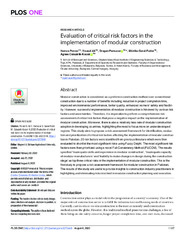Please use this identifier to cite or link to this item:
https://rfos.fon.bg.ac.rs/handle/123456789/2394Full metadata record
| DC Field | Value | Language |
|---|---|---|
| dc.creator | Pervez, Hamza | |
| dc.creator | Ali, Yousaf | |
| dc.creator | Pamučar, Dragan | |
| dc.creator | Garai-Fodor, Monika | |
| dc.creator | Csiszarik-Kocsir, Agnes | |
| dc.date.accessioned | 2023-05-12T11:45:09Z | - |
| dc.date.available | 2023-05-12T11:45:09Z | - |
| dc.date.issued | 2022 | |
| dc.identifier.issn | 1932-6203 | |
| dc.identifier.uri | https://rfos.fon.bg.ac.rs/handle/123456789/2394 | - |
| dc.description.abstract | Modular construction is considered as a preferred construction method over conventional construction due to a number of benefits including reduction in project completion time, improved environmental performance, better quality, enhanced workers' safety and flexibility. However, successful implementation of modular construction is hindered by various risk factors and uncertainties. Therefore, it is imperative to perform a comprehensive risk assessment of critical risk factors that pose a negative impact on the implementation of modular construction. Moreover, there is also a relatively less rate of modular construction adoption in developing countries, highlighting the need to focus more on underdeveloped regions. This study aims to propose a risk assessment framework for identification, evaluation and prioritization of critical risk factors affecting the implementation of modular construction in Pakistan. 20 risk factors were identified from previous literature which were then evaluated to shortlist the most significant risks using Fuzzy Delphi. The most significant risk factors were then prioritized using a novel Full-Consistency Method (FUCOM). The results specified 'Inadequate skills and experience in modular construction', 'Inadequate capacity of modular manufacturers' and 'Inability to make changes in design during the construction stage' as top three critical risks in the implementation of modular construction. This is the first study to propose a risk assessment framework for modular construction in Pakistan. The results of the study are useful to provide insights to construction industry practitioners in highlighting and eliminating risks involved in modular construction planning and execution. | en |
| dc.publisher | Public Library Science, San Francisco | |
| dc.rights | openAccess | |
| dc.rights.uri | https://creativecommons.org/licenses/by/4.0/ | |
| dc.source | PLoS One | |
| dc.title | Evaluation of critical risk factors in the implementation of modular construction | en |
| dc.type | article | |
| dc.rights.license | BY | |
| dc.citation.issue | 8 | |
| dc.citation.other | 17(8): - | |
| dc.citation.rank | M22~ | |
| dc.citation.volume | 17 | |
| dc.identifier.doi | 10.1371/journal.pone.0272448 | |
| dc.identifier.fulltext | http://prototype2.rcub.bg.ac.rs/bitstream/id/893/2390.pdf | |
| dc.identifier.pmid | 35939491 | |
| dc.identifier.rcub | conv_2844 | |
| dc.identifier.scopus | 2-s2.0-85135552393 | |
| dc.identifier.wos | 000933388000030 | |
| dc.type.version | publishedVersion | |
| item.cerifentitytype | Publications | - |
| item.fulltext | With Fulltext | - |
| item.grantfulltext | open | - |
| item.openairecristype | http://purl.org/coar/resource_type/c_18cf | - |
| item.openairetype | article | - |
| Appears in Collections: | Radovi istraživača / Researchers’ publications | |
SCOPUSTM
Citations
39
checked on Nov 17, 2025
Page view(s)
14
checked on Dec 28, 2025
Download(s)
6
checked on Dec 28, 2025
Google ScholarTM
Check
Altmetric
This item is licensed under a Creative Commons License


